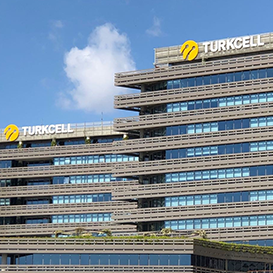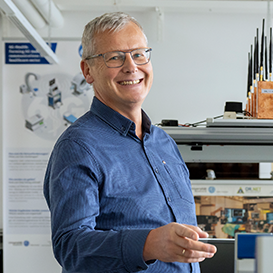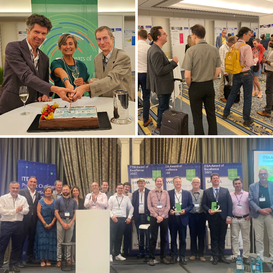
Focus on Türkiye
Investing in ICT to enhance competitiveness and international profile
The software industry is worth $2 trillion on a global scale while the market value of the sector is estimated at eight to ten times this figure. The former includes factors such as revenue, job creation and productivity gains while the latter refers to the total combined value of all companies and assets within the industry, indicating strategic importance in the economic chain effects that the world of software creates. The Turkish government has recognised the significance of this industry for the country’s economic development and has taken measures to nurture its growth – something they will continue to do as Eureka President for the upcoming year. Dr. Ayda Kara Pektaş, Scientific Programmes Chief Expert and ITEA Cluster National Contact Point of Türkiye at TÜBİTAK, explains how the ICT sector is stimulated in Türkiye and the role that public-private collaborative initiatives play to support the country’s policies and goals.
The figures tell a tale
“If we look at the software industry, ecosystem and growth through to 2025,” Ayda begins, “the additional employment potential is 100,000 jobs and the export potential is $10 billion. Software market revenue is projected to reach $659 billion in 2023 and, with an annual growth expected of 5.42%, this will result in a market volume of $858 billion by 2028.” Impressive figures. “Today the digital transformation has an important place in the transition to a competitive production economy in all sectors,” Ayda continues, “and the software sector stands out as a strategic sector in the development of the basic components of digital transformation as well as Industry 5.0 and the software industry. It is one of the most critical sectors today, certainly given the added value it provides to all vertical sectors and the export potential it brings to digital products and services.”
Boosting the economy
The ICT industry, including the software and software-intensive sector, has been growing in importance in Türkiye, becoming a very significant contributor to Türkiye’s economy, creating jobs, generating revenue and contributing to the country’s GDP. “Not only does the ICT sector provide employment opportunities for a considerable number of people, including software developers, IT professionals, engineers, technicians and other related roles, but this has a very positive impact on reducing unemployment rates,” Ayda says. “In terms of innovation and research, investment has increased in rich research and development activities, which fosters innovation, technological advancements and the development of new products and services. Furthermore, the software and software-intensive sector has the potential to be a strong contributor to Türkiye's export earnings with the export of high-quality software development and technology services to global markets, further boosting foreign exchange revenue.”
Looking beyond borders
Another policy pillar is entrepreneurship and startups. “In Türkiye, we facilitate growth in this area and promote the emergence of a vibrant startup ecosystem where many young entrepreneurs and innovators focus on creating technology-driven solutions and thereby contribute to overall economic growth and job creation. Of course, the digital transformation is a kind of umbrella that covers various sectors, and the Turkish government has been actively promoting digital transformation in government services, healthcare, education and more. This emphasis on digitalisation further drives the demand for ICT services and solutions. Last, but not least, international competitiveness. As the global economy becomes more technology-driven, Türkiye has focused on developing its ICT sector to enhance the country’s competitiveness and international profile. It is also one of the key reasons for supporting ITEA projects. We want companies to look beyond and be active in the ecosystem with the big players, with SMEs and other players in a wider context.”
Our government does its best to support industry and one of the best examples of how we do this is through the ITEA Cluster.
National priorities
As for Türkiye’s software innovation priorities, the parallels with ITEA are evident. But, as Ayda explains, green and digital technologies are key. Ayda: “We have defined six technology roadmaps: AI, advanced materials, big data, cloud computing, motor technologies, cybersecurity and biotechnology/pharmaceuticals. Compliance with EU green digital and adaptation to climate change are not only national priorities but are, of course, global priorities. There are actually 264 national priority topics, half of which are in digital technologies and a quarter in green technologies. I think this is a very good example of how our priorities match with those of the ITEA Cluster.” Innovative and groundbreaking technological solutions have been classified under five themes: (1) climate change environment and biodiversity; (2) clean and circular economy; (3) clean, accessible and secure energy supply; (4) green and sustainable agriculture;(5) Sustainable Intelligent Transportation. The last pillar of strategic and needs-oriented policy topics ranges from earthquake research, chemical and biological defence and biomedical equipment technologies to monitoring national biodiversity and value-added chemicals from purple resources. “Not specifically related to the ITEA Cluster but, nonetheless,” Ayda points out, “areas in which we want to encourage projects and address these pressing societal challenges, and indeed areas in which software and AI have their role to play.”
Incentives for innovative solutions
The Turkish government offers various incentives to encourage research and development activities in the software sector, such as tax incentives, grants and subsidies for companies engaged in softwarerelated RD&I projects. Türkiye has been establishing technology development zones and innovation centres where companies can set up their operations and enjoy benefits such as tax exemptions, access to shared facilities and cooperation opportunities with universities and research institutions as well as the Turkish government. “Incentives are provided to support startups, which often play a very crucial role in driving innovation and the software sector as well as incubators and accelerators, with funds to nurture young technology companies,” Ayda says. “Türkiye is actively collaborating with international organisations, research institutions and technology companies to exchange knowledge, access global best practices and promote technology transfer. Collaboration between public and private sectors plays a very crucial role here. Various innovation competitions and challenges are organised to encourage individuals and teams to develop innovative software solutions. The TEKNOFEST technology festival, attended by more than 2.5 million people just in 2023, is one of the best examples of this. Also, the government push for digital transformation across various sectors creates a demand for software solutions, leading to the opportunities for software companies to develop innovative products and services.”
The collaborative mix
From large to small, companies that rely heavily on technology and innovation can play a very crucial role in meeting the country’s national priorities. “Of course, large industries often have the resources, infrastructure and expertise to drive significant advancements in technology and innovation. It’s undeniable, “Ayda says. “And they can allocate substantial funds to research and development activities, leading to the creation of innovative products, services and technological technologies that align with Türkiye’s national priorities. They can set the pace for innovation within sectors, inspiring smaller businesses and startups to follow suit. We have seen how this formula is very successful within ITEA, where very small companies can create projects with the main players in the ecosystem, coming together when otherwise that small company would never have a chance to work with that big player. By adopting cutting-edge technologies and practices, large industries can influence the overall technology landscape of the country and encourage the adoption of advanced solutions. In addition, large industries contribute significantly to employment as they grow and innovate. They create job opportunities for skilled professionals in contributing to economic growth and social stability. Also, in project collaboration with SMEs and research organisations, they foster innovation through knowledge sharing and technology transfer.”
“SMEs, in turn, form the backbone for many economies, Türkiye being no exception. Their role in meeting national priorities is vital. They focus on niche markets and specific innovations that can have a very big impact in their areas of expertise. They are agile, able to quickly respond to changing market demands and technology trends, leading to rapid innovation. SMEs also contribute significantly to job creation, especially for local communities. Collaboration with universities, research institutes and technology centres plays a very pivotal role in driving innovation, developing practical applications of research and meeting national priorities. The role of research organisations and universities in educating the next generation of innovators, scientists and engineers contributes to a skilled workforce. Overall, I can say that a symbiotic relationship among large industries, SMEs, research organisations and government initiatives is essential in driving innovation, economic growth and technological advancements to meet national priorities.”
The ITEA ingredient
“Our government does its best to support industry and one of the best examples of how we do this is through the ITEA Cluster,” Ayda says. “If you look at the last three years or so, we have the highest number of applications taken up as projects among all the ITEA countries, putting Turkish partners top of the ranking for the last four ITEA Calls. This underlines our commitment, and we are eager to continue to support ITEA and all the work that we do together with this Cluster under the umbrella of Eureka, which we are honoured to chair as President for the year ahead.”
More information:
https://www.tubitak.gov.tr/en

Other chapters
Use the arrows to view more chapters

Editorial
By Jean-François Lavignon

25 years of ITEA
The ITEA journey

Country Focus: Türkiye
Investing in ICT to enhance competitiveness and international profile

Turkcell
Becoming a deeper part of the ecosystem

Community Talk with Frank Golatowski
A long-lasting happiness

ITEA Success story: TESTOMAT Project
Customised test automation, saving time and improving quality

25 years of ITEA
Ground-breaking innovations we’re still grateful for today

SME in the Spotlight: Solana Networks
Looking to the horizon of network security

ITEA Success story: COMPACT
Faster, more efficient software through automation

Navigating the future of ITEA
Current challenges and future directions

By and for end users
Gränges further digitalises aluminium engineering with the help of VMAP analytics

25 years of ITEA: PO Days through time
Celebrating 25 years of international collaboration

